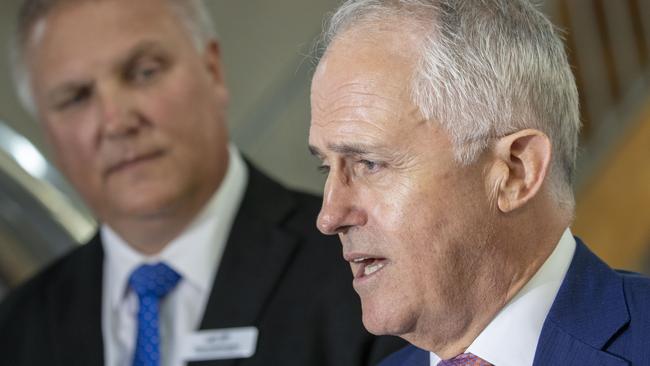Prime Minister Malcolm Turnbull wants to see Facebook testify on Huawei at parliamentary joint committee
Malcolm Turnbull says he’d welcome Mark Zuckerberg testifying in front of a security committee over Facebook’s links to Huawei.

Malcolm Turnbull says he would welcome Facebook being compelled to testify in front of the Australian parliament’s intelligence and security committee and “would love to see the boss”, Mark Zuckerberg.
The deputy chairman of the parliamentary joint committee on intelligence and security, Labor MP Anthony Byrne, told The Australian last night Facebook and its 34-year-old founder owed answers to the social network’s 15 million Australian users, following revelations of its “backdoor deal” with Huawei, the Chinese technology giant with links to the Communist Party.
Mr Byrne has been backed by the Turnbull government’s chairman of the committee, Liberal MP Andrew Hastie, in a bipartisan response to revelations that Facebook had shared personal data with Huawei, which has been banned from government contracts in Australia, including the NBN, on the advice of ASIO.
Mr Turnbull said there were a lot of privacy concerns relating to Facebook, and Cybersecurity Minister Angus Taylor had been discussing new measures the government was bringing in to address some of the issues.
“I would welcome Facebook coming and testifying before our parliamentary committees, yes,” the Prime Minister said.
Asked whether he would like to see Mr Zuckerberg testify personally, as he did in US Congress, Mr Turnbull said: “Of course, we’d love to see the boss.”
“Naturally, he is the founder, but the important thing everyone is paying a lot of attention to the issue of privacy, and, of course, the question of whether people really know what is being done with their personal data,” Mr Turnbull said.
“These social media platforms have developed relatively recently. You’ve got to remember it’s only, you know, Facebook itself was only founded in 2005. It’s not a long time ago.
“But they’ve become so dominant in every respect, in terms of the way people use them in their lives, whether it’s personally, socially and in business, and, of course, they’re enormous platforms for advertising as well.

“So, it is important that we keep a very close eye on this and make sure that if people’s data is being used, it is being used in a way that they understand and that they have been able to consent to, and consented to with full information, of knowing what precisely they are signing up for.”




